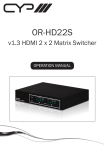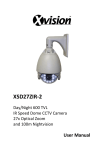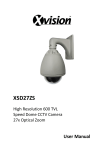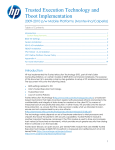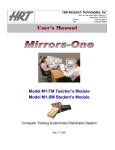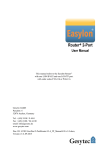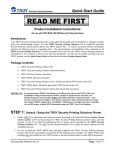Download HSM-04-04 - Hall Research
Transcript
User’s Manual HSM-04-04 HSM-04-02 Genesis Digital ™ HDMI / DVI Matrix Switch Series HSM-04-04 HSM-I-04-04 HSM-04-02 HSM-I-04-02 CUSTOMER SUPPORT INFORMATION 4x4 HDMI Matrix Switch with RS-232 4x4 HDMI Matrix Switch with RS-232 & IP 4x2 HDMI Matrix Switch with RS-232 4x2 HDMI Matrix Switch with RS-232 & IP Order toll-free in the U.S. 800-959-6439 FREE technical support, Call 714-641-6607 or fax 714-641-6698 Address: Hall Research, 1163 Warner Ave. Tustin, CA 92780 Web site: www.hallresearch.com E-mail: [email protected] UMA1181 Rev. D Genesis Digital™ HDMI Matrix Switches TRADEMARKS USED IN THIS MANUAL Hall Research and its logo are trademarks of Hall Research. Any other trademarks mentioned in this manual are acknowledged as the property of the trademark owners. FEDERAL COMMUNICATIONS COMMISSION RADIO FREQUENCY INTERFERENCE STATEMENT This equipment generates, uses, and can radiate radio frequency energy and if not installed and used properly, that is, in strict accordance with the manufacturer’s instructions, may cause interference to radio communication. It has been designed to comply with the limits for a Class A computing device in accordance with the specifications in Subpart B of Part 15 of FCC rules, which are intended to provide reasonable protection against such interference when the equipment is operated in a commercial environment. Operation of this equipment in a residential area is likely to cause interference, in which case the user at their own expense will be required to take whatever measures may be necessary to correct the interference. Changes or modifications not expressly approved by the party responsible for compliance could void the user’s authority to operate the equipment. 1 User’s Manual Contents 1. Introduction ........................................................................................................................... 3 1.1 General.................................................................................................................................. 3 1.2 Features ................................................................................................................................ 4 2. Installation ............................................................................................................................. 5 2.1 Package Contents ................................................................................................................. 5 2.2 Input and Output Connections .............................................................................................. 5 Table 1 – RS-232 Control Port Pin out ........................................................................................ 7 2.2 Connection Block Diagram.................................................................................................... 7 3. Configuration & Operation ................................................................................................... 8 3.1 Front-Panel Buttons and Indicators ....................................................................................... 8 3.2 Turning the unit on and off .................................................................................................... 8 3.3 Making AV Routings or “Ties” from Front Panel.................................................................... 9 3.4 Making AV Routings or “Ties” Using IR Remote ................................................................. 10 3.5 Saving Presets (routing patterns) ........................................................................................ 10 3.6 Recalling Presets (routing patterns) .................................................................................... 10 4. Control Commands (RS-232 and IP) ................................................................................. 11 4.1 Routing Functions ............................................................................................................... 11 4.2 Preset Save and Recall Functions ...................................................................................... 12 4.3 Power Functions ................................................................................................................. 12 4.4 Special Commands ............................................................................................................. 12 4.5 Invalid Commands .............................................................................................................. 13 5. IP Control Basics ................................................................................................................ 14 5.1 Getting Device IP Address .................................................................................................. 15 5.2 Controlling the Matrix via Web Interface ............................................................................. 15 5.3 IP Specific Serial Commands.............................................................................................. 20 6. Telnet Interface .................................................................................................................... 21 6.1 Telnet Interface Commands ................................................................................................ 21 7. Troubleshooting.................................................................................................................. 22 7.1 Contacting Hall Research ................................................................................................... 22 7.2 Shipping and Packaging ..................................................................................................... 22 8. Specifications ...................................................................................................................... 23 Appendix 1 – Front Panel Quick Reference Guide .............................................................. 24 Appendix 2 – Command Summary........................................................................................ 24 2 Genesis Digital™ HDMI Matrix Switches 1. Introduction 1.1 General Thank you for purchasing this professional quality and compact Genesis™ Matrix Switch from Hall Research. This User’s Manual applies to both 4x2 and 4x4 HDMI Matrix Switchers. As members of Hall’s Genesis™ series, these matrices are synonymous with high performance, intuitive and powerful user interface, easy to use control command set, and unsurpassed reliability. The Matrix switches are HDMI 1.3 compliant (and 1.4 for color-depth and 3D), support HDCP, deep color, multi-channel digital audio (up to 7.1 channels), and may be used with any combination of DVI (PC) or HDMI (HDTV) sources and displays. The Matrix uses Silicon Image chipsets capable of color depth conversion independently for each output. This assures that the highest numbers of colors possible are displayed on each output. In other words if some outputs are connected to displays that only support HDMI 1.2 and others to 1.3, the unit will report as supporting HDMI 1.3 to each input source in order to receive the deepest color depth possible. EDID management, fast switching, low profile (only 1 RU), PRESET Save and Recall functions, IR remote, and comprehensive front panel controls, make the Genesis Digital matrices ideal for home theater, conference room, multimedia presentation systems, and other similar settings. The Matrix Switchers are optionally available with IP (LAN) port that allows control from any browser via HTTP web server (including web enabled smart phones) for control through other web appliances. The web interface allows the user to assign custom names for each input, output, and preset pattern, making control over IP a snap. 3 User’s Manual 1.2 Features 4 • Compatible with HDMI version 1.3, 1.4 (for color-depth and 3D), and DVI • Supports a wide range of HDTV (HDMI) and PC (DVI) resolutions from 480i to 1080p and VGA to WUXGA • Supports digital video formats in Deep Color 12bit • Supports lossless digital audio: both 5.1 and 7.1 Dolby TrueHD, Dolby Digital Plus and DTS-HD Master Audio • Powerful and intuitive front panel controls • Preset Save and Recall of commonly used routing patterns • EDID management prioritizes the highest capable displays (HDMI 1.3 takes precedence over 1.2 , and HDMI support supersedes DVI) • Internal EDID emulation user selection option • Output video signals are de-skewed and recreated with perfect timing and are jitter free. • Includes IR remote control • Front panel IR sensor and rear panel connector for optional IR detector cable (for instances where the unit is not in line of sight) • Supports HDMI cables up to 15 meters (50 feet) long on its input, and drive cables to 15 meters on the outputs. • Includes RS-232 port with Hall Research’s Genesis Control Command Set (GCCS) • Optional IP (LAN) port for browser control • Optional IP (LAN) versions includes web-server with easy to use controls (customizable with user definable names for each input and output) • 1RU high compact & rugged rack mountable metal enclosure • Uses Silicon Image (founding member of HDMI) Chipsets • Assembled in USA Genesis Digital™ HDMI Matrix Switches 2. Installation 2.1 Package Contents Your package should contain the 1RU Matrix Switcher, a Universal power supply (5v DC @ 6A), an IEC320 Power Cord, an IR remote control, and a User’s Manual. Figure 1 – Power Supply and IR Remote Notice Use only regulated 5v DC supply (center positive) as supplied with the unit. Use of any other voltage will cause damage to the unit and void the warranty. 2.2 Input and Output Connections The matrix is housed in a 1RU 19” wide rack mountable enclosure. All of I/O, control, and the power connections are on the rear of the unit. Figure 2 – Rear Panel Connections (for HSM-I-04-04) 5 User’s Manual Using quality HDMI cables connect the inputs to video sources. If the sources are DVI (PC) then you will need either a DVI to HDMI adapter, or preferably, a DVI to HDMI Cable Figure 3 – Model C-HDMI-DVI-xM (x = 2, 3 or 5 meters) For a professional installation, we recommend using locking HDMI cables. The Matrix Switch has a tapped hole above each HDMI connector and the locking cables available from Hall Research come with screws and standoffs for securing the cables in place so they don’t accidentally get unplugged Figure 4 – Model C-HDMI-L-x (x = 1.5, 3, 6, 10, 15, 25, 35 or 50 ft) Next, connect the HDMI outputs to the displays. Plug the power supply to the unit. Use only the supply that came with the unit There is an IR remote detector (eye) on the front panel of the unit, however, if the unit is to be situated in a closet or enclosure, it may be necessary to use an IR detector cable and locate the “eye” somewhere more convenient. Hall Research can provide such a cable that will plug into a jack on the rear of the HSM matrix Figure 5 Model CIR-DET-D1 6 Genesis Digital™ HDMI Matrix Switches If the matrix needs to be controlled via RS-232, plug the controller (or PC) to the DB9 Female port on the rear of the matrix. Make the connection to the PC’s DB9 Male connector using a straight-through DB9 MF cable. Table 1 – RS-232 Control Port Pin out The HSM matrices are available with IP network port (HSM-I- …).On these units there is an RJ45 (10/100 Base-T) for connection to your Local Area Network (LAN). These units feature a user friendly and powerful built-in webserver that allows control of the matrix via any browser for control using web enabled controllers. 2.2 Connection Block Diagram Figure 6 – Connection Block Diagram 7 User’s Manual 3. Configuration & Operation 3.1 Front-Panel Buttons and Indicators An image of the front panel for the 4x4 matrix is shown below. The 4x2 units have fewer OUTPUT buttons, but otherwise are the same. Figure 7 – HSM-04-04 front panel controls & indicators The front panel can be used for the following purposes: • Monitor & Control Power On/Off status • View current Input/output routings (ties) on Routing Status LED Grid on the front panel • Make new ties either starting from input or from output • Recall preset patterns • Save preset patterns All of the front panel switches have built-in LEDs that help in the operation. Front panel functions are designed for maximum intuitiveness. With just a little practice, one can easily learn to monitor and control the matrix. 3.2 Turning the unit on and off To turn the unit on, press the power button. The unit performs a simple LED test where all buttons and LED’s are gradually turned on over a few seconds. Then the matrix will recall the last routing pattern prior to being shut -down and update the Routing Status LED Grid. To turn the matrix off, press and hold the power button for 5 seconds. This is done to prevent accidentally turning off the unit if the power button is accidentally pressed. 8 Genesis Digital™ HDMI Matrix Switches 3.3 Making AV Routings or “Ties” from Front Panel To make the unit as convenient and intuitive as possible the HSM matrix allows you to make ties starting from the input channel’s point of view or from the output. 3.3.1 Making a tie starting from the output This is the most natural way of making connections since each output gets its signal from only one input. Note that once you start making selections from the front panel, if you do not hit any buttons for approximately 10 seconds, the system will exit this mode without any user interaction. First, press one of the output channel buttons. That output button will light up and the current input routed to that output will light up. At this point if you change your mind, and do not want to make any changes, just hit SET. If you want to change to another output channel, use either the up and down ▲▼) ( buttons to walk through other outputs ; or just select another output channel. To route the output to a different input than the one currently connected to, hit the “candidate” input channel number. This does not actually make the connection; the new input channel will be blinking. Again if you change your mind, either hit the same blinking button (it will stop blinking), or hit another input channel. When you are sure you have selected the input channel you desire, hit SET. 3.3.2 Making a tie starting from the input The procedure is similar to the above but a particular input can be routed to more than one output. Press one of the input channel buttons. That button will light up and ALL the outputs routed from that input will light up. If you want to change to another input channel, use either the up and down (▲▼) buttons to walk through other inputs; or just select another input channel. To route the selected input to single or multiple outputs, press the output buttons. Again, these new outputs are only “candidates” (will be blinking) and will not be routed until you hit the SET button. 9 User’s Manual 3.4 Making AV Routings or “Ties” Using IR Remote The remote control is very simple; outputs are labeled as A-D and they correspond to 1-4 on the rear of the box. Press the input channel you want the output connected too. Note that the IR remote makes connections as soon as you hit the button! Figure 8 It takes about 1 to 2 seconds for the matrix to do the routing (HDCP handshake requires a little time), so if you are going to change more than one output, pause for moment between pressing the buttons! - IR 3.5 Saving Presets (routing patterns) The number of presets accessible from the front panel is the same as the total # of input and output buttons. Therefore, each front panel button can memorize a pattern. For a 4x4 matrix, you can recall 8 presets and for a 4x2 you can recall 6 presets. However, through the IP or Serial port, the unit can store and recall 8 presets regardless of matrix configuration. Current tie configurations can be saved as presets (1 through 8) for later recall. To save the current AV routing pattern, press and hold the PRE button for 3 sec, the backlit LED will start flashing (this means that save function is activated). Press the desired input button to save the preset then press the SET button to complete the operation. 3.6 Recalling Presets (routing patterns) Press and release the PRE (preset) button. The button will light up solid. Then press and release one of the channel buttons and hit SET. 10 Genesis Digital™ HDMI Matrix Switches 4. Control Commands (RS-232 and IP) The Genesis™ Matrices can be controlled via an external control system by using either the standard RS-232 or the optional IP port. Any program capable of standard serial communication in ASCII format is capable of working with the matrix. Most PCs with Windows™ OS have HyperTerminal™ or equivalent. There are also many free Terminal Emulator software programs available for download on the internet. Note on RS-232 port availability on PC Most PCs and notebooks do not come equipped with a serial RS-232 port. Therefore, for serial control from a PC you may need a USB to RS-232 converter. These are available from Hall Research (Model USB-RS2321). Figure 9 – USB to RS-232 Adapter Use a DB9 Male-to-Female cable per Table 1 to connect the unit to the PC’s serial port. Use 9600 Baud, 8 bits, No Parity, 1 Stop bit, No flow control. Upon power up, the Matrix will output a screen similar to below through its serial port. Special characters shown in <> brackets. <cr> is the carriage return character (0x0D), <lf> is the line feed character (0x0A) COMMAND PW0<cr> CO1,1<cr> CO2,2<cr> CO3,3<cr> CO4,4<cr> HD1,0<cr> HD2,0<cr> HD3,0<cr> HD4,0<cr> MEANING POWER IS OFF INPUT 1 ROUTED TO OUTPUT 1 INPUT 2 ROUTED TO OUTPUT 2 INPUT 3 ROUTED TO OUTPUT 3 INPUT 4 ROUTED TO OUTPUT 4 NO VIDEO INPUT ON OUTPUT 1 NO VIDEO INPUT ON OUTPUT 2 NO VIDEO INPUT ON OUTPUT 3 NO VIDEO INPUT ON OUTPUT 4 4.1 Routing Functions NOTE: HDMI Video and Audio always routed together. Video routing commands specified are from the point of view of the output. The wildcard character ‘*’ is acceptable for output (but not input). In addition, these commands can be used to monitor or query the status of system ties. Omitting the input channel will result in a response of the current routing for that output. 3.2.2.1 To make a video tie: Important Note on Control Commands Notice about Additional Commands Almost all commands issued to the Matrix will elicit a response from the Matrix once the command is accepted and execution completed. After issuing any command, you must wait for the matrix’s response prior to sending another command. If you send another command prior to completion of the previous one, the matrix might ignore the 2nd command. HSM matrices equipped with IP Port have special Serial Commands to change IP address parameters. Please refer to section 5.3 for IP specific serial commands. 11 User’s Manual Command: Response: Variations: Command: Response: Command: Response: COn,m<cr> COn,m<cr> stands for Connect Output n to input m COn <cr> stands for Connect Output n Query COn,m<cr> CO*,m<cr> stands for Connect All Outputs to input m CO1,m<cr> CO2,m<cr> CO3,m<cr> (for 4x4 matrices only) CO4,m<cr> (for 4x4 matrices only) 4.2 Preset Save and Recall Functions Command: Response: Command: Response: PRx<cr> stands for Preset Recall. x = preset 1~ 8 CO1, m1<cr> CO2, m2<cr> CO3, m3<cr> (for 4x4 matrices only) CO4, m4<cr> (for 4x4 matrices only) PSx<cr> stands for Preset Save. x = preset 1~ 8 None (the current tie pattern is saved in EEPROM) 4.3 Power Functions Command: Response: PW1<cr> stands for Power On PW1<space><cr> CO1, m1<cr> CO2, m2<cr> CO3, m3<cr> (Only for 4x4 matrices) CO4, m4<cr> (Only for 4x4 matrices) Important Note on Power ON Command This command can take up to 10 seconds to complete. Upon powering up the unit will recall the previous state of each output prior to powering off and restore each connection. Command: Response: Variation: Command: Response: PW0<cr> PW0<cr> stands for Power Off PW<cr> stands for Power Query PWx<cr><lf> x=0 (off), or 1 (on) 4.4 Special Commands Command: Response: 12 FB<cr> stands for Firmware Boot Depends on power state when the command was issued. This command is equivalent to unplugging the power supply and reconnecting it. Genesis Digital™ HDMI Matrix Switches HDm<cr> stands for HDCP Status Query on input m HDm,x<cr> x=0 (no video detected on input), x=1 (video detected on input without HDCP), x=2 (video detected on input with HDCP). This command is useful for several purposes. For example, if you do not have HDCP compliant displays on all outputs and you try to send an input with HDCP to an output display that is not HDCP compliant, you will not get an image. This command enables you to check the status of each input and only route content that can be displayed to those outputs. In addition, since this command detects presence of video on inputs, you can use it to check status of inputs and reroute outputs if there is no video on the input currently routed. Command: Response: Command: Response: EDx<cr> stands for EDID Emulation. x=1 (default HDTV), x=0 (Fully Emulated Hall Research DVI) EDx<cr> This command is used to change the way EDID is reported to the sources. The default setting is 1. In this mode, the EDID is algorithmically constructed based on the capabilities of all the LCD’s connected at all outputs. The special setting is 0. In this mode, the first 128 bytes of EDID table correspond to Hall Research canned emulation, in which most standard PC (both 4x3 and 16x9) resolutions are reported to all the inputs. This mode should be used if your inputs are from PC’s DVI and you are having trouble getting the full complement of resolution choices. Please note that after changing the EDID emulation mode you must either unplug and reconnect the unit, or issue a FB (firmware boot) command. Variation: Command: Response: Command: Response: ED<cr> This command is used to query the current setting of the EDID Emulation setting ST<cr> stands for Status Query PW1<cr> CO1, m1<cr> CO2, m2<cr> CO3, m3<cr> CO4, m4<cr> HD1, x1<cr> HD2, x2<cr> HD3, x3<cr> HD4, x4<cr> FR<cr> stands for Factory Reset FR <cr> PW0 <cr> This command is used to clear all the preset ties in memory. It also connects all the outputs to the same input and powers the unit off. If your unit also has an IP interface, this command does not erase user defined names nor IP address assignments. Please see FD command in IP section which does the same but also restores the IP interface to factory default status. 4.5 Invalid Commands Avoid using invalid commands! Lengthy garbage strings or irrelevant RS-232 data sent to the matrix can cause system crash. Wrong commands or those with syntax error will prompt the following response: INVALID COMMAND<cr> 13 User’s Manual 5. IP Control Basics Serial Control IP Control HTTP Control Telnet Control RS-232 Port Port 80 Web Server Matrix Command Processing Port 6324 Telnet Server Figure 10 – IP Control Block Diagram As shown in the figure above, the matrix can be controlled via RS232 Serial port or through an IP (Ethernet) port if equipped. The IP interface features a built-in web server allowing web browsers running on different devices (computer, smart-phone, tablet) on the network to control and monitor matrix through HTTP protocol on port 80. (Section 5 will walk you through this HTTP based Web Interface). The IP interface also supports telnet connection over port number 6324 to control and monitor matrix. (Section 6 describes the telnet-based interface) The IP interface on every matrix shipped has a unique MAC-address, and must have a valid IP-address to function properly on your network. Notice As shipped from factory, DHCP is enabled. This means that the users DHCP router automatically assigns an IP address to the Matrix. To find the IP address assigned to the matrix, use the DeviceFinder Software available free from Hall Research’s website. 14 Genesis Digital™ HDMI Matrix Switches 5.1 Getting Device IP Address The HSM matrix comes preconfigured for DHCP, which means it will automatically obtain an IP address when it is connected to the users LAN network. It is recommended that you set a static IP on each system in order to guarantee it maintains the same address. In order to set a static IP, first discover what DHCP address was issued to the matrix and then login to the matrix web interface to reconfigure the settings. (see section 5.2 below) Figure 11- DeviceFinder Download and install the Hall Research Device Finder utility. Once installed, run the program and it will scan your LAN and locate any compatible Hall Research devices that are connected. 5.2 Controlling the Matrix via Web Interface The Genesis Matrices with IP option have a powerful, yet easy to use IP based web interface to control and monitor matrix. Web browser application running on any device (Computer, Smart phone, iPad™) on the same network can use this interface. When the matrix is shipped, it is configured with a dynamic IP address and when powered up on a compatible network, the end-users DHCP router will assign an IP address. You can find the matrices IP address on your network by using the Device Finder utility available free from the Hall Research website. Once you have the correct IP address of your device from the Device Finder utility, open a compatible web browser and type http://your.devices.ip.address in the address bar and hit Enter. The web page shown will automatically format the display for the browser it is running on. This means that on a Smart Phone the width and character sizes will be optimized so you do not have to deal with zooming and scrolling the screen to use the matrix. Furthermore, all elements on the web page screen are automatically updated from server side. This means that if the video routing is altered by the front panel of the matrix or from another simultaneous LAN connection, your browsers screen will automatically reflect the change. 15 User’s Manual Figure 12 – Control via web Interface The matrix web interface allows the user to change/monitor the matrix I/O ties, assign unique names to the inputs, outputs and presets as well as enable/disable password protected login or change the IP configuration, etc… The Preset, Input and Output names are saved permanently in matrix until the user changes them. The matrix will also remember the I/O Presets when not powered. The web interface is user friendly and easy to access. It consists of three tabs named Routing, Labels and Settings. Each tab and its features are explained in next sections. 16 Genesis Digital™ HDMI Matrix Switches 5.2.1 Video Routing Tab The routing tab allows the user to control the matrix I/O ties, save the current configuration as a preset, load existing presets and turn the matrix on or off. Please refer to Figure 13 for a typical example screen of the routing tab, as it would appear on a Smart-Phone. Figure 13- Video Routing Tab Outputs Column Displays the name for the selected matrix output. You cannot change the output names (labels) here. Labels can be changed using the Labels tab Inputs Column Two (for a 4x2 matrix) or four (for a 4x4 matrix) dropdown buttons allow the user to select the desired matrix input to tie to the respective matrix output. The also shows the current tie status and is updated in real time. Recall Preset Previously saved ties may be saved in the matrix and can be recalled for quick changes to the matrix. First, select the desired preset you want to load from the dropdown menu and then click the Recall Preset button to load an existing configuration from memory. Save Preset Select the preset name from the dropdown menu and Click Save Preset to save current tie pattern as a preset with that name. ON/OFF These buttons show the status of matrices power and can be used to turn it on and off. The button with red border is the current state and cannot be clicked. For example in figure 13 above, the matrix is ON and you can turn it off by clicking the OFF button. 17 User’s Manual 5.2.2 Labels Tab The user can assign descriptive names inputs, outputs and presets on this tab. Label names are limited to 16 characters long including white space, and can have special symbols. Apply Button Click this button to save your changes after changing the names. 5.2.3 Settings Tab Settings tab helps user to change IP address, enable/disable DHCP, enable/disable password, change current password and load factory default settings whenever necessary. Name User defined name for this matrix. The name can be sixteen (16) characters including any white space and special characters. Location User defined location of this matrix. Location can be twenty (20) characters long including white space and special characters. Figure 14- Labels Tab IP Displays the current IP address of this matrix and if DHCP is disabled, allows the user to enter a new IP address. Subnet Displays the current SUBNET MASK address of this matrix and if DHCP is disabled, allows the user to enter a new subnet mask. Gateway Displays the current GATEWAY address of this matrix and if DHCP is disabled, allows the user to enter a new gateway address. 18 Figure-15 Settings Tab Genesis Digital™ HDMI Matrix Switches DHCP Enables/ Disables DHCP. If enabled, the matrix is assigned an IP address from the user’s compatible networks DHCP router. This is the factory default. If disabled, the matrix is assigned the IP address, subnet mask and gateway address supplied by the user. Login Enables/Disables the system login password. If enabled, the matrix will require a password in order to operate the controls. If disabled, the matrix requires no password to operate the controls. This is the factory default. Telnet Enables/Disables the telnet interface. See Section 6 for more details Change Password? Allow the user to change the existing system password. When clicked, a window will open for entering the new password. The password length is limited to eight (8) characters long. Apply The User must click this button after changing any field on settings tab to save the changes. Factory Default Settings for IP interface Field Power INPUT1 Value GUI Tab Off HDMI_In_1 Routing Labels Factory Reset INPUT2 HDMI_In_2 Labels This button restores the factory defaults to this matrix. Factory default will also wipe out saved presets. INPUT3 HDMI_In_3 Labels INPUT4 HDMI_In_4 Labels OUTPUT1 HDMI_Out_1 Labels OUTPUT2 HDMI_Out_2 Labels OUTPUT3 HDMI_Out_3 Labels OUTPUT4 HDMI_Out_4 Labels PRESET1 PRESET_1 Labels PRESET2 PRESET_2 Labels PRESET3 PRESET_3 Labels PERSET4 PRESET_4 Labels PRESET5 PRESET_5 Labels PRESET6 PRESET_6 Labels PRESET7 PRESET_7 Labels PRESET8 PRESET_8 Labels Name HSM Matrix Settings Location Hall Research Settings IP Assigned by DHCP Based on IP Settings Subnet Gateway Settings Settings DHCP Assigned by DHCP Enabled Login Disabled Settings Telnet Enabled Settings Default P d pass Settings Settings 19 User’s Manual 5.3 IP Specific Serial Commands The HSM matrix is equipped with a standard RS-232 interface, which allows the user to assign a static IP address. Please refer section 4 to connect a PC to Matrix over an RS-232 serial interface. Once you are connected use following commands to change the network settings or restore the factory defaults. 5.3.1 Changing the network settings of unit Note: All commands are case sensitive Command: IP<space><ip_address_value><cr> Where ip_address_value stands for the desired IP address Success Response: IP=<ip_address_value> Error Response: “Err! IP Address is not valid” or “IP address not changed” Command: SB<space><subnet_address_value><cr> Where subnet_address_value stands for the desired subnet mask Success Response: SUBNET=<subnet_address_value> Error Response: “Err! SUBNET Address is not valid” GW<space><gateway_address_value><cr> Where gateway_address_value stands for desired gateway address Success Response: GATEWAY=<gateway _address_value> Error Response: “Err! GATEWAY Address is not valid” Command: Notice User MUST enter ALL THREE Commands mentioned above with the correct values and must get ‘success response’ for each in order to change the network settings. The following message confirms that user has received a ‘success response’ for all of the above commands and device is applying user settings: “Applying settings to Matrix please wait” If you did not receive the above message, renter ALL THREE values again WAIT until you see following Welcome message on Screen. It confirms that device has done with applying settings and serial interface is ready for other commands. “Welcome to Hall Research HSM matrix” 5.3.2 Restoring factory defaults FD<cr> “Applying Factory Defaults To Matrix- Please Wait For Welcome Message.” This command loads factory defaults (for both IP interface and all routing memory including presets). This command is available only for units that have IP interface. With this command you don’t need to use FR command since as part of the action it performs the FR function as well. Wait until you see following welcome message on terminal screen. “Welcome to Hall Research HSM matrix serial interface. Please refer to user manual for matrix serial commands.” Command: Response: 20 Genesis Digital™ HDMI Matrix Switches 6. Telnet Interface The HSM telnet interface is an IP based command line interface to control and monitor the matrix. Only one (1) client is allowed to connect at a time through this interface and with every new connection, the old connection will be automatically closed. The Telnet connection timeout is set to infinity or until the user closes the current connection. The Telnet authentication required depends on authentication status of web interface. If telnet authentication is enabled, the password required will be same as what used for web interface. The user can also disable the telnet interface from the web interface. Figure-16 Putty client configuration To use this interface, the user must open a TCP socket connection on port 6324 using a compatible telnet client to communicate with matrix. Figure-16 shows an example of using the PUTTY client on a Windows™ compatible PC. Mac and Linux users can use the default telnet client. Note Regarding Telnet Port # The standard telnet port for the Matrix is 6324, however older units (shipped prior to 2012), may use port # 45454 instead 6.1 Telnet Interface Commands Telnet interface uses same commands as HSM serial (RS232) interface as described section 4 above. The expected responses on the telnet interface are the same as serial interface. Avoid Using Invalid Commands If you are planning to control the Matrix via Telnet, please make sure that the controller does not send debug or other irrelevant communication to the Telnet port as this may hang up the Matrix ( hi d i 2012) # 45454 i d d 21 User’s Manual 7. Troubleshooting There are no field serviceable parts or circuits in the device. Opening the device will void the warranty. If you think the device is malfunctioning, please contact Hall Research. 7.1 Contacting Hall Research If you determine that your Genesis™ Matrix is malfunctioning, do not attempt to repair the unit; instead, contact Hall Research Technical Support at 714-641-6607. Before you do, make a record of the history of the problem. We will be able to provide more efficient and accurate assistance if you have a complete description. 7.2 Shipping and Packaging If you need to transport or ship your unit: • Package it carefully. We recommend that you use the original container. • Before you ship the units back to Hall Research for repair or return, contact us to get a Return Authorization (RMA) number. 22 Genesis Digital™ HDMI Matrix Switches 8. Specifications Video Standards Signal type Connectors Video Data Rate Supported Colors HDMI Cable Length HD Resolutions PC Resolutions Audio Supported Formats General Power Supply Nominal Power Temperature/humidity Cooling Mounting Enclosure type Dimensions Product weight Shipping weight Recommended cable Vibration Safety EMI/EMC MTBF Warranty HDMI 1.3 (1.4 compliant for video color depth and 3D), DVI (single link) TMDS video, DDC EDID (0 to 5 v TTL) HDMI Type A (Female) with Locking 2.25 Gbps RGB, YCbCr 4:4:4, YCbCr 4:2:2, xvYCC From source 15 m (50 ft) at any resolution or color depth, to display 15 m (50 ft) 1080p, or 7.5 m (25 ft) at deep color 480i, 480p, 576i, 576p,720p, 1080i, 1080p 8 or 12 bits per channel (24 or 36 bits aggregate) VGA through UXGA PCM2, PCM5.1, PCM7.1, Dolby5.1, DTS5.1, DD+, D-TrueHD, DTS-HD 100 VAC to 240 VAC, 50-60 Hz, external; 5 VDC, 6 A, regulated Fully loaded, 17 watts max (3.4 amps @ 5v) Storage: -40 to +158 °F (-40 to +70 °C) / 10% to 90%, non-condensing Operating: +32 to +104 °F (0 to +40 °C) / 10% to 90%, non-condensing Convection Front panel 1RU 19” Rack mountable Metal 1.69" H x 17.3" W x 7.68" D - F/P Width is 19" (43 mm H x 440 mm W x 195 mm D) 9 lb (4 kg) 10 lb (4.5 kg) Locking High-Performance HDMI cables ISTA 1A in carton (International Safe Transit Association) CE CE, FCC Class A 90,000 hours 2 years parts and labor Specifications are subject to change without notice 23 User’s Manual Appendix 1 – Front Panel Quick Reference Guide Figure 17 – Control buttons on the front panel Function Procedure View ties or Make ties Hit any of the INPUT or OUTPUT Buttons Recall Presets To change ties, hit any INPUT or OUTPUT then hit SET Hit PRE (button lights up) Save Presets Hit any INPUT or OUTPUT button Hold PRE until it starts blinking Power ON/OFF Hit any INPUT or OUTPUT button To turn on hit power button To turn off Press and hold power button Appendix 2 – Command Summary Command Function PWx PRx Power on/off x=0 power off, 1 power on Omitting x will show current power status Connect Output n = output, m= input Omitting ,m will show current connections Preset Recall... x = preset # can be 1 to 8 PSx Preset Save HDn FB Read Input Status, n = Input # Returns: 0 No Video EDID Management1 Vid 0: DVI Emulated EDID 1 C tBoot d HDTV (D fthelt)entire system) Firmware (Resets ST Status Report FD Factory Reset for IP enabled matrices FR Factory Reset for Non-IP enabled matrices COn,m EDn 24 ... x = preset # can be 1 to 8 © Copyright 2013. Hall Research, Inc. All rights reserved. CUSTOMER SUPPORT INFORMATION Order toll-free in the U.S. 800-959-6439 FREE technical support, Call 714-641-6607 or fax 714-641-6698 Mail order: Hall Research, 1163 Warner Ave. Tustin, CA 92780 Web site: www.hallresearch.com E-mail: [email protected]

































